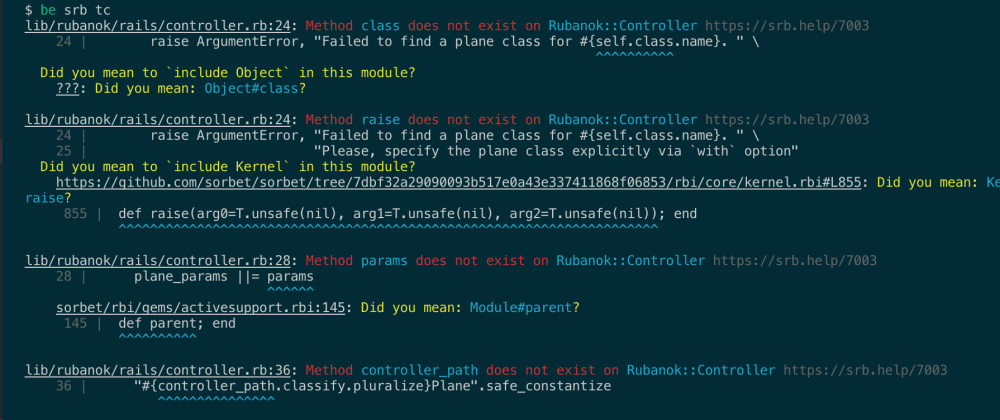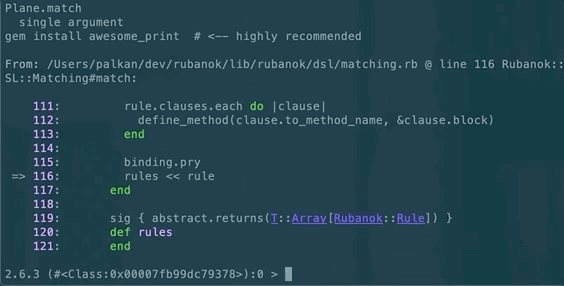NOTE: this post was written a few days after the first public Sorbet release (on 2019-06-20). If you're reading this months after that happened, most of the things described here could be no longer relevant.
Stripe has finally open-sourced their long-awaiting static type checker for Ruby—Sorbet. I've been waiting for this for more than a year since it was first announced.
To be honest, I'm not a big fan of type annotations, or more precisely, I'm on the "I hate type annotations" side.

 Amr Abdelwahab(عمرو)@amrabdelwahab
Amr Abdelwahab(عمرو)@amrabdelwahab 08:08 AM - 21 Jun 2019
08:08 AM - 21 Jun 2019
But as a member of Ruby community, I'm glad to see something like this happening: this is a huge leap forward for Ruby itself (especially, compared to other evolutionary features like pipeline operator). Stripe team did a great job 👍!
After reading about Brandon's first impression (highly recommend to check it out), I decided to give Sorbet a try and integrate it into one of my gems.
tl;dr type checker works great, but not ideal; annotations are ugly; tooling leaves much to be desired.
Rubanok meets Sorbet
I decided to use rubanok for this experiment: it's the simplest gem of mine in terms of the amount of code and metaprogramming.
You can find the adoption PR here: https://github.com/palkan/rubanok/pull/5.
bundle exec srb init
The first phase of the adoption is to add sorbet gem to the bundle and generate all the required files (read more and see the screenshots of this process here).
Unfortunately, it didn't go so well:
$ bundle exec srb init
👋 Hey there!
...
Traceback (most recent call last):
15: from /ruby/gems/2.6.0/gems/sorbet-0.4.4280/bin/srb-rbi:232:in `<main>'
...
3: from /ruby/gems/2.6.0/gems/sorbet-0.4.4280/lib/gem_loader.rb:553:in `require'
2: from /ruby/gems/2.6.0/gems/rspec-rails-3.8.2/lib/rspec-rails.rb:4:in `<top (required)>'
1: from /ruby/gems/2.6.0/gems/rspec-rails-3.8.2/lib/rspec-rails.rb:6:in `<module:RSpec>' /ruby/gems/2.6.0/gems/rspec-rails-3.8.2/lib/rspec-rails.rb:8:in `<module:Rails>':
uninitialized constant Rails (NameError)
RSpec Rails refers to Rails constant in its code but doesn't require rails anywhere in the code (it should be somewhere here).
As far as I understand, Sorbet evaluates each file for building .rbi configs for your bundle and it doesn't know how to handle such exceptions.
That's an edge case that should be solved at the rspec-rails side (would you like to open a PR?).
There is a similar open issue regarding optional dependencies as well.
Adding rails as a dev dependency helped to solve this issue (honestly, don't why 🤷♂️).
After that, a new folder, sorbet/, appeared in the project directory with a bunch of .rbi files:
$ find sorbet -type f | wc -l
55
As the documentation suggests, you should put this directory into your version control system. Even though type signatures are not so heavy (as node_modules/, for example), I hope this will change in the future. The raw size (w/o .git/) of rubanok increased by 2.1MB, from 124KB to ~2.2MB.
bundle exec srb tc
When you first run the type checking command, you should not see any errors:
$ bundle exec srb tc
No errors! Great job.
That's because Sorbet adds the # typed: false magic comment to all the source files by default. This strictness level only checks for critical problems (constants, syntax, invalid signatures).
Gradual type checking implies that you make your source code type-aware step-by-step by changing # typed: false to # typed: true (or even # typed: strong).
Problem #1. Unsupported features.
I started by enabling type checks for the core Rubanok class—Rule:
$ be srb tc
lib/rubanok/rule.rb:62: Method Rubanok::Rule#empty? redefined without matching argument count. Expected: 0, got: 1 https://srb.help/4010
62 | def empty?(val)
^^^^^^^^^^^^^^^
lib/rubanok/rule.rb:56: Previous definition
56 | def empty?
That's strange; I don't have duplicate method definitions, RuboCop could catch this easily. What made Sorbet think so? This:
using(Module.new do
refine NilClass do
def empty?
true
end
end
refine Object do
def empty?
false
end
end
end)
def empty?(val)
return false unless Rubanok.ignore_empty_values
val.empty?
end
Looks like Sorbet doesn't recognize anonymous modules and treats their contents as the "parent" module contents. Hopefully, it seems to be an easy fix and a good first contribution:
 Comment for
#1010
Comment for
#1010
Thank you for a great issue report with a great reproducer!
For those interested to contribute, this should be super easy to fix:
https://github.com/sorbet/sorbet/blob/master/dsl/ClassNew.cc is already handling Class.new, it should additionally handle Module.new.
Note that this problem has nothing with refinements themselves (although I think they are not supported at all and will not be anytime soon).
I quickly fixed this by moving the refinement outside of the Rule class. But at what cost? That made it less clear why and where we need this refinement. The code became a bit more entangled. And that's just the beginning...
Problem #2. Limitations of flow-sensitivity
After toggling # typed: true for another class, Plane, I found another interesting case:
$ bundle exec srb tc
lib/rubanok/plane.rb:50: Method <= does not exist on NilClass component of T.nilable(Class) https://srb.help/7003
50 | if superclass <= Plane
^^^^^^^^^^^^^^^^^^^
Autocorrect: Use `-a` to autocorrect
lib/rubanok/plane.rb:50: Replace with T.must(superclass)
50 | if superclass <= Plane
^^^^^^^^^^
lib/rubanok/plane.rb:51: Method rules does not exist on Class component of T.nilable(Class) https://srb.help/7003
51 | superclass.rules.dup
^^^^^^^^^^^^^^^^
lib/rubanok/plane.rb:51: Method rules does not exist on NilClass component of T.nilable(Class) https://srb.help/7003
51 | superclass.rules.dup
^^^^^^^^^^^^^^^^
Autocorrect: Use `-a` to autocorrect
lib/rubanok/plane.rb:51: Replace with T.must(superclass)
51 | superclass.rules.dup
^^^^^^^^^^
The "violating" code:
def rules
return @rules if instance_variable_defined?(:@rules)
@rules =
if superclass <= Plane
superclass.rules.dup
else
[]
end
end
Is this a bug? Don't think so: as far as I know, the only case when superclass returns nil is BasicObject. Or if we redefine the .superclass method 😜
The suggested solution—using T.must(superclass)—is not a good fit: I don't want my code to have dirty hacks only to satisfy the type system.
I've tried to make Sorbet happy the other way—by unwrapping the superclass value:
def rules
return @rules if instance_variable_defined?(:@rules)
@rules =
if superclass && superclass <= Plane
superclass.rules.dup
else
[]
end
end
That didn't have any effect—still the same errors. I've tried again:
def rules
return @rules if instance_variable_defined?(:@rules)
@rules =
if superclass
if superclass <= Plane
superclass.rules.dup
else
[]
end
else
[]
end
end
Still the same :( The last attempt (I thought):
def rules
return @rules if instance_variable_defined?(:@rules)
x = superclass
@rules =
if x
if x <= Plane
x.rules.dup
else
[]
end
else
[]
end
end
Almost works:
$ bundle exec srb tc
lib/rubanok/plane.rb:53: Method rules does not exist on Class https://srb.help/7003
53 | x.rules.dup
^^^^^^^
Errors: 1
But why it cannot infer the superclass class from the x <= Plane check?
If you check the complete list of constructs that affect Sorbet’s flow-sensitive typing, you can find that only Class#< is supported but not Class#<< 🤷♂️
OK. Let's replace x <= Plane with x < Plane (this is actually a breaking change: someone could define global rules on Rubanok::Plane class itself, which is not a good idea but...).
Problem #3. Signatures vs modules.
Adding signatures for Rule and Plane went pretty smooth (LOC increased from 159 to 196). And I didn't have to change any code.
Then I turned on type checking for DSL modules, Mapping and Matching.
These modules implement the particular Rubanok transformations and extend the Rubanok::Plane class.
The first problem occurred with a pretty standard Ruby code. Here is the simplified example:
class Rule
sig do
params(
fields: T::Array[Symbol],
activate_on: T::Array[Symbol]
).void
end
def initialize(fields, activate_on: fields)
# ...
end
end
module Mapping
def map(*fields, **options, &block)
rule = Rule.new(fields, options)
end
end
This code raises the following type error:
$ be srb tc
lib/rubanok/dsl/mapping.rb:25: Passing a hash where the specific keys are unknown to a method taking keyword arguments https://srb.help/7019
25 | rule = Rule.new(fields, options)
^^^^^^^^^^^^^^^^^^^^^^^^^
Seems legit: do not allow passing an arbitrary hash as the known keyword arguments.
Let's try to add a signature for the #map method using shapes:
sig do
params(
fields: Symbol,
options: {
activate_on: T::Array[Symbol]
},
block: T.proc.void
).returns(Rule)
end
def map(*fields, **options, &block)
rule = Rule.new(fields, options)
end
(Expectedly) didn't help:
$ bundle exec srb tc
./lib/rubanok/mapping.rb:34: Passing a hash where the specific keys are unknown to a method taking keyword arguments https://srb.help/7019
34 | rule = Rule.new(fields, options)
^^^^^^^^^^^^^^^^^^^^^^^^^
Got T::Hash[Symbol, {activate_on: T::Array[Symbol]}] originating from:
./lib/rubanok/mapping.rb:33:
33 | def map(*fields, **options, &block)
^^^^^^^^^
This Got T::Hash[Symbol, {activate_on: T::Array[Symbol]}] looks suspicious. Where did it found a hash with Symbol keys? No idea.
I gave up and duplicated the keywords for the #map method:
sig do
params(
fields: Symbol,
activate_on: T::Array[Symbol],
block: T.proc.void
)
.returns(T::Array[Rubanok::Rule])
end
def map(*fields, activate_on: fields, &block)
rule = Rule.new(fields, activate_on: activate_on)
# ...
end
This doesn't seem right to me: now I need to think about keeping these signatures in sync in three different places (the type checker will definitely help here), there is a chance that I will lose this very crucial activate_on: fields default value (the type checker cannot help here).
If you know how to add signatures without changing the code itself—please, leave a comment!
The second problem with modules relates to the fact that they are only meant for extending the Rubanok::Plane class; thus they "know" a few things about the Plane API and use it. For example, they use #rules method:
def map(*fields, activate_on: fields, &block)
rule = Rule.new(fields, activate_on: activate_on)
# ...
rules << rule
end
Sorbet has no idea of our intent; hence, it reports this error:
lib/rubanok/dsl/mapping.rb:38: Method rules does not exist on Rubanok::DSL::Mapping https://srb.help/7003
38 | rules << rule
I couldn't find anything similar to this situation in the docs, only the section devoted to interfaces turned out to be useful: I marked the module as abstract! and defined an abstract #rules method:
sig { abstract.returns(T::Array[Rubanok::Rule]) }
def rules
end
It made this error disappeared. Bonus: see what happens if you remove or rename the Plane.rules method:
$ bundle exec srb tc
lib/rubanok/plane.rb:36: Missing definition for abstract method Rubanok::DSL::Mapping#rules https://srb.help/5023
36 | class << self
^^^^^
lib/rubanok/dsl/mapping.rb:47: defined here
47 | def rules
^^^^^^^^^
Problem #4. Metaprogramming.
Metaprogramming is what makes Ruby such a powerful language (and makes me love Ruby).
Ruby without metaprogramming is not Ruby.
On the other hand, this is one of the things that makes static type checking so tricky. I don't expect a type checker to be so smart and know how to deal with any meta stuff; I only need from it a canonical way to handle the situations like the one described below.
The #match method provided by Matching module generates dynamic methods, which rely on a couple of Plane instance methods:
define_method(rule.to_method_name) do |params = {}|
clause = rule.matching_clause(params)
next raw unless clause
apply_rule! clause.to_method_name, clause.project(params)
end
Sorbet didn't like it:
$ bundle exec srb tc
lib/rubanok/dsl/matching.rb:106: Method raw does not exist on Rubanok::DSL::Matching https://srb.help/7003
106 | next raw unless clause
^^^
lib/rubanok/dsl/matching.rb:108: Method apply_rule! does not exist on Rubanok::DSL::Matching https://srb.help/7003
108 | apply_rule! clause.to_method_name, clause.project(params)
^^^^^^^^^^^^^^^^^^^^^^^^^^^^^^^^^^^^^^^^^^^^^^^^^^^^^^^^^
Errors: 3
The trick with adding abstract methods didn't work out (since we need to add instance methods, not singleton ones).
Re-generating hidden definitions* didn't work either.
I didn't find anything better than adding a custom RBI file to the repo:
# sorbet/meta.rbi
# typed: true
module Rubanok::DSL::Matching
sig { returns(T.untyped) }
def raw
end
sig { params(method_name: String, data: T.untyped).returns(T.untyped) }
def apply_rule!(method_name, data)
end
end
Yet another hack. "Enough," I thought, and didn't even try to enable type checking for Rails controller integration concern.
* I tried to check how hidden definitions work with a more straightforward example:
# typed: true
class A
def x
"y"
end
define_method(:xx) do
x * 2
end
end
After running bundle exec srb rbi hidden-definitions I found the following line in sorbet/hidden-definitions/hidden.rbi:
class A
def xx(); end
end
So, Sorbet found this define_method. And, for some reason, it also changed # typed: true to # typed: false. After turning it back, I got:
$ bundle exec srb tc
lib/rubanok/a.rb:9: Method x does not exist on T.class_of(A) https://srb.help/7003
9 | x * 2
^
lib/rubanok/a.rb:4: Did you mean: A#x?
4 | def x
^^^^^
Errors: 1
As we see from the error message, Sorbet treats #xx as a class method. There is a relevant open issue: #64.
Problem #5. Runtime checks.
So far, I only tried to make static checks pass but haven't tried to run the code:
$ bundle exec rspec
NameError:
uninitialized constant Rubanok::Rule::T
Right, we have signatures in our code, which we haven't loaded yet.
I added the require "sorbet-static" line to the main project file. And I was a bit surprised:
$ bundle exec rspec
LoadError:
cannot load such file -- sorbet-static
My bad: I assumed that you could use Sorbet without runtime checks and that's what sorbet-static gem is for.
As it turned out, there is no way to avoid
sorbet-runtimeif you have signatures in your code.
I started to hate type annotations more: I don't want to add an additional dependency to the gem, even if the overhead of type checking is <10% (which is still more than 0%):
 Dmitry Petrashko@darkdimius
Dmitry Petrashko@darkdimius @cm_richards @sorbet_ruby @_solnic_ @stripe We run it in production. We measure overhead. We page if overhead is >=7% of cpu time.21:08 PM - 20 Jun 2019
@cm_richards @sorbet_ruby @_solnic_ @stripe We run it in production. We measure overhead. We page if overhead is >=7% of cpu time.21:08 PM - 20 Jun 2019
OK. Let's play this game 'till the end.
After adding sorbet-runtime I was able to run the code and even caught one "problem":
$ bundle exec rspec
Failure/Error: rules << rule
RuntimeError:
You must use `.implementation` when overriding the abstract method `rules`.
Abstract definition: Rubanok::DSL::Matching at /Users/palkan/dev/rubanok/lib/rubanok/dsl/matching.rb:119
Implementation definition: #<Class:Rubanok::Plane> at /Users/palkan/dev/rubanok/lib/rubanok/plane.rb:53
Why didn't static analysis caught this?
UPD: it's possible to "disable" runtime checks by using T::Sig::WithoutRuntime.sig instead of sig to write signatures. And it's not possible to write extend T::Sig::WithoutRuntime instead of extend T::Sig 😄
Problem #6. Debugging.
I'm a heavy user of binding.pry.
When I was debugging the code with type signatures, I found it's very hard to step into the method:
Can you find where is the original method hiding?
In conclusion, or it's just the beginning
Sorbet is one of the most important things that happened to Ruby in the last few years.
But it's still far from bringing the development happiness. And it's you who can help it become better: give it a try, report issues or say "Thanks!" to people behind it (e.g., Dmitry Petrashko and Paul Tarjan).
Will I use Sorbet?
Likely, yes. But only in the way described below.
After adding all the signatures to the codebase (full adoption), I want to be able to dump them into a .rbi file and clean up the codebase. Thus, my Ruby code stays the same: less verbose and more readable.
That should break neither static nor runtime checks, i.e., if sorbet-runtime is loaded, runtime checks are activated, otherwise—not. Static checks should work just because of the presence of the RBI files.
P.S. I'm only talking about libraries development right now.
P.P.S. I want to try to adopt Steep as well and compare the process to the one described above. We'll see which one I like more.
Read more dev articles on https://evilmartians.com/chronicles!








Top comments (16)
Is debugging with
binding.prystill an issue if runtime checks are disabled? I don't see how sorbet could mitigate this cleanly without digging deeper into one specific Ruby implementation.BTW: Do the runtime checks work with Rubies other than MRI? Looks like a pure Ruby gem but that's not a guarantee for compatibility.
I haven't tried it, but I'd expect not. Presumably they implement it with
TracePoint, which can register and unregister for events (ie I would expect it is implemented without changing the actual structure of the code)As far as I can see, there is no TracePoint usage. They use method_added instead to redefine the method and wrap it with the signature validation.
So, it doesn't seem to have anything MRI specific.
Hi Vladimir, thanks for your article. In the current state I don't think I'd adopt it either. To be honest I'm not sure it's going to scale easily considering how most Rails apps load tons of gems full of metaprogramming and DSLs.
Stripe AFAIK does not use Rails, Sorbet should be easier in a Ruby-only project.
A few comments:
2 Megabytes for a small library... It's probably a fixed increase of size though, I don't think it's directly proportional to how many signatures or definition files.
I think this is the same problem the Javascript community had when trying TypeScript. The type checker needs to evolve with the language and AFAIK there's no formal spec of Ruby so you have to track each change manually anyway.
BTW I didn't know Sorbet is written in C++
You did a lot of wrangling there. It's the thing that annoys me from these checkers, the time spent to make the tool happy
Can I say that this signature looks ridiculous? I'm thinking of the cognitive complexity that adds for devs at all levels.
I agree when you say that the tool should move the signatures away from the code, or at least have a switch that can do that.
Code is read much more than it's written.
7% of CPU overhead is a lot for an already slow language. Stripe has a ton of VC money, they can just scale up the machines :D
:((((
Thanks for the comment!
Yep. But we also have Shopify, an early adopter/beta user of Sorbet. We haven't heard a lot about this adoption yet though.
And there are already some tools to make it easier to integrate with Rails: github.com/chanzuckerberg/sorbet-r....
So everyone is now shopify or [insert random company xyz]?
I mean there is a reason why this abomination has been created by a COMPANY. At the least they finally open sourced it - it was ludicrous that they promoted it while it was closed source.
Nice article. It seems like a really ambitious project. If I were working on it I would target a strict subset of Ruby and try to creep forward from there (I wonder if this is what Stripe have been doing internally).
Nice idea, although I think it kind of beats the purpose of types annotations, because every time you need to consult or adapt two files, instead of one.
I've been thinking too whether libraries should adopt Sorbet or not. As library maintainer, I don't want to force users to install Sorbet. I wish there would be a ways to enable those typechecks only if Sorbet is already present (because parent project decided to use that, or because I'm just developing my own library).
Probably it's a matter of time before some
sorbet-dummylib comes out, which would defined methods used by Sorbet (such assig), but does nothing and steps off when it detects that "real" Sorbet is available.The examples make it look like you can noop it with a simple
def sig(*) end. Is that not why you defined it in the block form?Honestly, I still can't see why type checking is ever necessary in Ruby?
What does it add to your codebase or workflow?
I think, type checking could bring value at a large scale: huge codebases, bigger teams (this post shares some thoughts on this topic).
For example, when you work on a large application you might not know all the internal APIs; type checking could help you to avoid
Undefined method foo for NilClasskind of errors when writing code using these unknown APIs. Documentation could also help but it could easily get out of sync.Refactoring with type system is also much easier and faster even if you have a decent test coverage: when test fails you have to spend time to figure out why; when type checking fails you know the exact place in code. That becomes useful when you have hundreds of such places to change.
If type checking fixed this we would never have seen
NullPointerExceptionin Java/.NET static typed worlds.Totally disagree that type checking helps with refactoring. My experience with Java and C# is exactly the opposite. It becomes a large pain to either a) need to change the param of a method to a different type or b) add a parameter to an existing method. Yes tools like resharper help, but most of the time you play compiler jujutsu trying to find just the right generic or whatever type necessary to satisfy all your existing code.
These changes become more cumbersome to implement. Duck typing allows these kind of changes with ease, and ruby method signatures are usually pretty flexible with keyword args, option splats etc being common.
I think we’ll tested systems mean type checking is totally superfluous. I moved to ruby from a C# /Java background and I have not missed types/generics one iota in Ruby. Keep ruby ducky :)
Thanks for the great post! Your findings are extremely valueable for anyone trying to adopt the Sorbet.
Why exactly?
It does not really address the type annotation situation from an objective point of view. To be fair it is also not that subjectively biased either; but even then he makes huge claims such as:
"this is a huge leap forward for Ruby itself (especially, compared to other evolutionary features like pipeline operator)."
He does not explain why it would be a "huge" leap forward. I don't see what is leaping here.
And he contrasts it to the pipeline syntax sugar. Well, I don't like the pipeline syntax either; don't hate it but just don't see a point. But this is still so totally different to the SCOPE of sprinkling type annotations all over a code base with the deliberate attempt to make it uglier and less readable than it was before, for the promised gain in return that certain errors will be caught (which real ruby hackers don't run into - you only have this problem IN BIG COMPANIES where the worker drones have to churn out code for a living).
Keep ruby clean - that should be the main motto.
Some comments may only be visible to logged-in visitors. Sign in to view all comments.